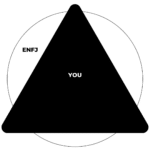What is a personality type?

Most people will describe themselves using their job, gender, or national identity. However, some describe themselves based on their identity, values, and core beliefs.
Personality types are a tool for self-awareness and for explaining how you think to a future employer, a friend, or a family member. People use personality psychology as a tool in dating, finding a promising career, or making decisions regarding their personal growth.
You can learn more about yourself and what you want by comparing yourself to others. Just remember, a personality type can only fit you in part. You’re a unique person, and while you can relate to a type, you’ll find that you have many other personality traits outside of a type, too.
Understanding the 16 Personalities
My name is Erik, and I’ve spent more than a decade exploring personality types. But what are the 16 personalities?
Depending on your personality, you have a unique combination of personality traits and characteristics that separate you from other personality types. But what do the different traits in your 16 personalities code mean?
Personality Types
The 16 Personalities cognitive functions
Because of their different traits, each personality type has unique thinking patterns, which we map out and explore as cognitive functions.

